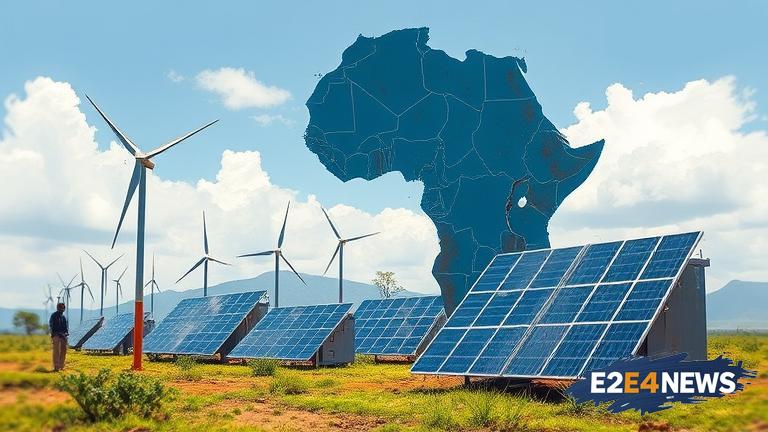The African continent is witnessing a significant shift towards renewable energy, driven by the need to address the pressing issues of energy access, climate change, and sustainable development. With many countries still struggling to provide electricity to their populations, renewable energy has emerged as a viable solution. Solar and wind power are becoming increasingly popular, with many African nations investing heavily in these sectors. For instance, South Africa has set ambitious targets to increase its renewable energy capacity, aiming to generate 20% of its electricity from renewable sources by 2030. Similarly, Morocco has made significant strides in developing its solar energy sector, with the launch of the Noor-Ouarzazate solar power plant, one of the largest in the world. Other countries, such as Egypt, Kenya, and Ghana, are also making notable progress in the adoption of renewable energy. The African Union’s Agenda 2063 has set a target of ensuring that at least 50% of the continent’s energy mix comes from renewable sources by 2030. To achieve this goal, many African countries are implementing policies and regulations to support the development of renewable energy. For example, Rwanda has introduced a feed-in tariff policy to encourage the development of small-scale renewable energy projects. Additionally, the African Development Bank has launched several initiatives to support the growth of renewable energy in Africa, including the creation of a $500 million fund to support the development of renewable energy projects. The use of renewable energy is not only helping to reduce Africa’s dependence on fossil fuels but also creating new economic opportunities and jobs. In fact, a report by the International Renewable Energy Agency (IRENA) estimates that the renewable energy sector could support up to 24 million jobs globally by 2030, with a significant proportion of these jobs being created in Africa. Furthermore, the adoption of renewable energy is also helping to improve energy access, particularly in rural areas where many communities lack access to electricity. For instance, off-grid solar systems are being used to provide energy to rural communities, enabling them to power their homes, schools, and businesses. The growth of renewable energy in Africa is also being driven by the declining cost of technology, making it more competitive with fossil fuels. According to a report by BloombergNEF, the cost of solar energy has fallen by over 70% in the last decade, making it more viable for African countries to adopt. Moreover, the use of renewable energy is also helping to mitigate climate change, which is having a devastating impact on the African continent. Rising temperatures, changing rainfall patterns, and increased frequency of extreme weather events are all threatening the livelihoods of millions of Africans. By transitioning to renewable energy, African countries can reduce their greenhouse gas emissions and contribute to global efforts to combat climate change. In conclusion, the renewable energy revolution in Africa is gaining momentum, driven by the need to address energy access, climate change, and sustainable development. With many African countries investing heavily in renewable energy, the continent is poised to become a global leader in the adoption of clean energy. As the world transitions to a low-carbon economy, Africa is well-placed to reap the benefits of this transition, creating new economic opportunities, jobs, and improving the lives of millions of people.
